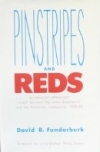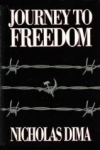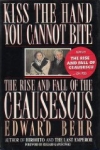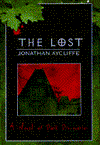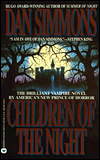|
MENU
Home
Books
Horror Film Aesthetics
Horror Film Festivals and Awards
Vampire
Nation
Pentagon Possessed
Cost of Freedom
Manhattan
Sharks
Halloween
Candy
Hollywood
Witches
Short Works
Pursuits
Actor
Film Festival Director
Editorial Services
Media
Appearances
Horror Film Reviews
Blogs
Horror Film Aesthetics
Communist Vampires
Horror Film Festivals and Awards
Other
Business
Satire
Nicolae Ceausescu
Commuist Vampires
Stalinist Zombies
L'Internationale Song
Links
|
Amazingly, regarding Vampire Nation, a TV writer once asked me, "Why the obsession about Communism? We already know all this. Why keep writing about it?"
I don't know that one novel constitutes an "obsession," but consider: Who would say that we "talk too much" about Nazism? That we've enough books and films about Nazis? That there is no more room for films like Inglorious Bastards? No one would say that.Yet Communism ruled a far greater geographic area, and lasted far longer, than did Nazism. There are many more stories to be told, both historical and fictional.
Some of the below books were helpful in my research for Vampire Nation. Others are just interesting.
 |
Red Horizons: The True Story of Nicholae & Elena Ceausescus' Crimes, Lifestyle,
and Corruption, by Lt. Gen. Ion Mihai
Pacepa, Former Head of Romanian Intelligence.
Author Pacepa
saw the Ceausescus first hand on a daily basis. Lurid details on
one of Communism's First Families (who could have appeared on Jerry Springer). Details the criminal, terrorist, drug, and espionage activities
of several Communist intelligence services, including Pacepa's talks with
Arafat, Gadhafi, and Tito. Pacepa defected to the U.S. in 1978, the
highest-ranking defector from an East Bloc nation. |
|
Ceausescu: The Unrepentant Tyrant, A&E Biography
If you want to
learn about Ceausescu, but don't have time for heavy reading, this A&E
Biography DVD is a painless introduction. 50 minutes long, and not expensive. |
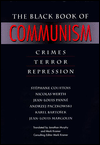 |
The Black Book of Communism: Crimes, Terror, Repression, by Stéphane
Courtois, Nicolas Werth, Jean-Louis Panné, Andrzej Paczkowski, Karel
Bartosek, Jean-Louis Margolin.
Harvard University
Press offers a comprehensive overview of the 20th century's Communist body
count (authors estimate 85-100 million killed worldwide). Covers
Communist mass murder in Eastern Europe, Africa, Asia, Latin America. Authors
demonstrate that: (1) Communism was a unified worldwide movement, and not
disparate national liberation movements, and (2) that totalitarianism,
repression, and mass murder are rooted in Communist ideology, and are not
aberrations from "true Communism." |
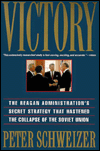 |
Victory: The Reagan Administration's Secret Strategy That Hastened the Collapse
of the Soviet Union, by Peter Schweizer.
Argues that President Reagan's strategy to outspend and outmaneuver
the East Bloc nations (e.g., he induced Saudi Arabia to increase
oil production, thus driving down the price of Soviet and Rumanian crude,
further aggravating their economic woes), won the Cold War. That had Bush or Carter won
the Presidency in 1980, Communists would likely still rule Eastern Europe. Yes, their economies would be shaky today, but their economies had always been shaky. Yet the West propped them up for over six decades. Reagan stopped that, which is why many streets in Eastern Europe are today
named after him. Cites declassified
Soviet Politburo documents in its support. |
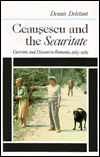 |
Ceausescu and the Securitate: Coercion and Dissent in Romania, 1965-1989, by
Dennis Deletant.
Deletant is a British
scholar, having written several academic books about Rumania, and is married
to a Rumanian woman. This book also relates the difficulties of getting
her emigration approved by the Communist government. |
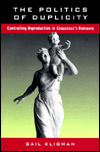 |
The Politics of Duplicity: Controlling Reproduction in Ceausescu's Romania,
by Gail Kligman.
Whereas Red China's
"one child" policy mandates abortions, Ceausescu enforced an abortion ban
by stationing Securitate officers in delivery rooms -- not from concern
for the unborn, but because he wanted an expanding population of ethnic
Rumanians. The result was a surfeit of sick abandoned orphans. A popular rumor (unconfirmed by Kligman) was that these orphans, embittered
and without family ties, made prime Securitate recruits. |
|
|
Pinstripes and Reds: An American Ambassador Caught Between the State Department and
Romanian Communists, 1981-1985, by David B. Funderburk.
Funderburk was nominated
by Reagan to serve as U.S. Ambassador to Rumania. His book provides
insight into the nomination and Senate confirmation process. He
was a political appointee rather than a State Dept. careerist, so he
received pressure from both ends, hence his subtitle. |
|
|
Journey to Freedom, by Nicholas Dima.
Part prison diary,
this is the autobiography of a young man imprisoned in Rumania in the 1950s
for trying to cross the border. A vivid portrait of life in a Communist
prison (both literal and the nation itself). He later moved to Canada, then returned to Rumania (with a Western passport) during the Ceausescu
era, and reports what he saw. |
|
Downfall:
The Ceausescus and the Romanian Revolution, by George Galloway and
Bob Wylie.
British paperback
published in 1991. Original research, crisp writing, balanced reporting. Includes post 1989 revolution interviews and photos with Ceausescu children
Nicu, Valentin, and Zoia. Nicu, speaking from prison, says Pacepa's Red
Horizons is "Lies, lies, and not even good lies!" |
|
Stalin's Secret War: A Startling Exposé of his Crimes Against the Russian
People, by Nikolai Tolstoy.
Author is descended
from Leo Tolstoy (of War
and Peace fame). Contains shocking accounts of Stalin's brutality
and extreme paranoia. Published in 1981 (by Holt, Rinehart, Winston). Recently released Soviet archives prove the truth
was even more shocking than detailed in this book. |
|
Karl Marx, Racist, by Nathaniel Weyl.
Karl Marx was
descended from rabbis, yet wrote the anti-Semitic A World Without Jews. Often described
by his contemporaries as "swarthy" in appearance, Marx indulged in racist slurs. Seems the man had "issues." |
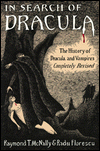 |
In Search of Dracula: The History of Dracula and Vampires, by Raymond
T. McNally & Radu Florescu.
Communist dictator Nicolae Ceausescu regarded the real life Dracula (Vlad Tepes, 1431-1476) as a national hero. Ceausescu commemorated
Dracula on stamps and statues, reproduced in
this book. Ceausescu condemned Western vampire movies as a slur on
the real life Dracula (who tortured & killed 20,000 - 100,000
people, depending on which source you believe). |
|
|
Kiss the Hand You Cannot Bite: The Rise and Fall of the Ceausescus, by Edward
Behr.
Much information on Ceausescu's early
years (how he became what he was) and the best accounting I've yet read
of his last days and hours before his capture and execution.
|
|
Romania,
a Country Study, edited by Ronald D. Bachman
First released in
1989 by the Federal Research Division of the Library of Congress under
their Area Handbook Series program. A dry read. Rumanian
military ranks and insignias are illustrated on pages 284 and 285. The Second Edition, 1991, still has the 1989 ranks & insignias (i.e.,
from the Ceausescu regime). |
A Communist
Vampire subgenre?
The brutality
of Ceausescu's regime, and Transylvania's location in Rumania since 1944,
should have inspired a spate of Communist vampire novels. Yet while
some recent vampire novels are set in post-Communist Rumania, I know of
none set during Communism. None, save Vampire
Nation.
Curiously, some
post-Vampire Nation films do contain some of my
novel's imagery and ideas.
|
|
The Lost, by Jonathan Aycliffe
A short literary
horror novel written in the epistolary format of Stoker's Dracula.
A young Brit inherits an isolated Transylvanian castle after the fall of
Ceausescu. Aycliffe's cynical post-Communist students ring true-to-life.
Atmospheric and entertaining. |
|
|
Children of the Night, by Dan Simmons.
Opens days after
Ceausescu's downfall. This horror/medical thriller (vampire blood
cures AIDS) is an uneven read, sometimes intriguing, sometimes too much
of a soap opera. The hero/priest doubts the existence of God, beds
the heroine/AIDS researcher, and leaves the Church. Well-researched,
yet not a novel about Communism. Ceausescu is portrayed as just the latest
of Dracula's puppet rulers. |
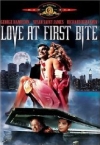
|
Love at First Bite
Comedy in which
Dracula emigrates to the US. In an early scene, Dracula is evicted
from his newly nationalized castle by the Communist government. Leaving,
he adds, "Just remember, without me this place will be as exciting as Bucharest
on a Monday night." |

|
Maus,
by Art Spiegelman
Award-winning
comic book about the Nazi holocaust. Like Vampire
Nation and Animal
Farm, an example of dark fantasy that teaches history. |

|
The Breed
This odd made-for-cable
film is about an NSA (National Security Agency?) officer who discovers
real-life vampires. Shot in Hungary, the sets have a vaguely East
European Communist, Orwellian milieu. Yet these are the good
guys! And we're supposed to think that we're in some (alternative?) United
States? I found its fantasy premise confusing. |
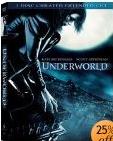 |
Underworld
Kate Beckinsale's
vampire assassin resembles Vampire Nation's vampire-hunter assassin. Underworld is about a vampire vs. werewolf war. In Vampire
Nation, that was World War 2, the Nazis being the werewolves. |
There is also Vampyre,
a film that may or may not exist. A web page described Vampyre as a film about a good vampire who fights Ceausescu's Securitate during
the '89 Revolution. No information about its production company,
distributor, cast, writer, or director. Nor have I found any mention
of Vampyre anywhere
(on the web or in books) aside from that one web page, now extinct.
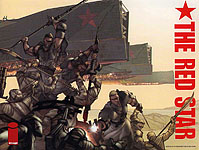 |
Comic books and
graphic novels of related interest include The
Red Star (a futurist alternate universe that combines communism and
the supernatural) and Commies
From Mars (an underground sci-fi satire, with sexually graphic imagery). |
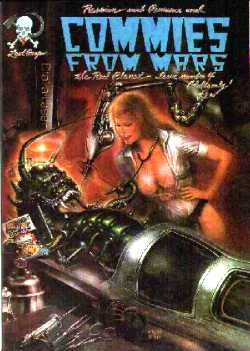 |
|






